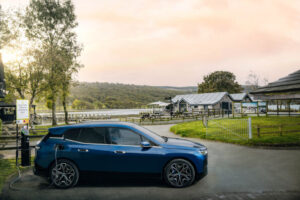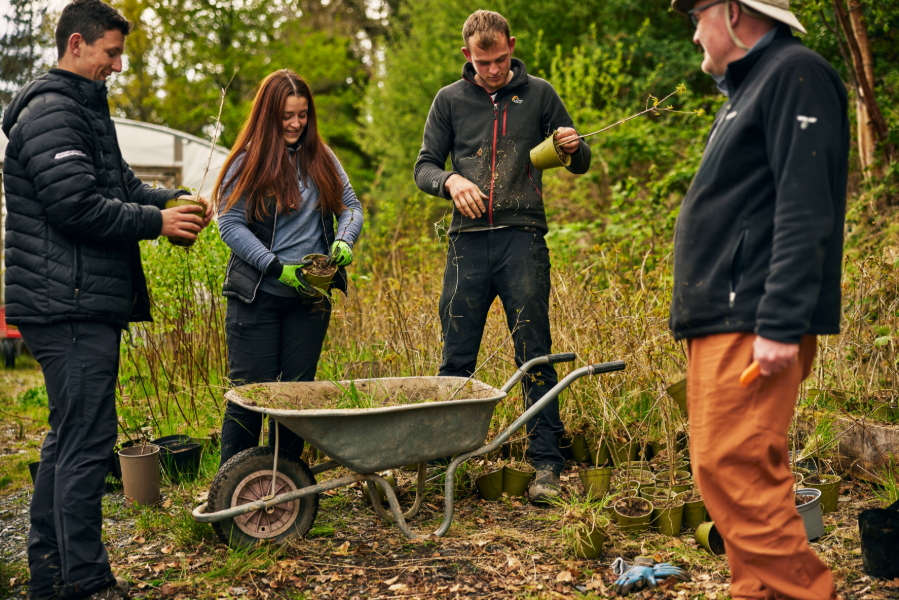BMW UK and UK National Parks today celebrate the success of their three-year “Recharge in Nature” partnership, revealing the project’s impact on the electric vehicle (EV) charging network, nature restoration and wellbeing across all fifteen National Parks.

Beginning in 2022, the Recharge in Nature partnership has seen BMW UK invest a total of £1 million in biodiversity and community projects, as well as funding the installation of 135 new EV charging sockets across the fifteen National Parks. To date, eight National Parks now have chargers live, with installations in the remaining seven National Parks set to be completed by November.
With chargers now installed in many of the National Parks including the Lake District, Peak District, Yorkshire Dales, North York Moors, Dartmoor, New Forest and Bannau Brycheiniog, BMW has worked closely with UK National Parks to ensure that these charging points benefit both local people and visitors, by being placed in high traffic areas or areas where infrastructure is lacking.
Emily Barrow, Brand Communication Manager at BMW UK said “Recharge in Nature is a shining example of how partnerships with business can drive meaningful progress. Through investment in electric infrastructure and nature restoration, we’ve created a lasting legacy that supports not just the environment, but also the communities that care for and enjoy these incredible spaces.”
The partnership has also funded 15 critical biodiversity and community projects developed and delivered by the National Parks expert teams, ensuring BMW’s support was received exactly where needed most.
Examples of this include in Eryri National Park, Llyn Tegid – the largest natural freshwater lake in Wales – which is now better protected against pollution. Through engagement with local farmers, Recharge in Nature has supported a range of natural flood management initiatives including creating three new dew ponds and eight natural dams, and planting over 20,000 new trees. These measures help reduce the speed of rainwater run-off, lowering the amount of phosphates leaching into the lake, which would damage its delicate ecosystem and encourage the growth of algae. The project will help Llyn Tegid stay healthy for tourism, and for precious wildlife like the glutinous snail – a tiny creature that’s only found here.
Young people have been at the heart of a project funded in the North York Moors National Park, where they have improved their wellbeing, employability and potential to become tomorrow’s conservationists through 3,000 hours of participatory activity that included learning transferable skills and volunteering. In addition, funding for a new Youth Engagement Ranger in Dartmoor National Park has helped give 1,329 young people, many of whom might otherwise not have opportunities to visit the National Park, a chance to experience and explore the great outdoors.
Catherine Hawkins, Chair of National Parks Partnerships said: “This partnership exemplifies what can be achieved when organisations unite around shared values. BMW UK’s support has not only helped dramatically increase access to EV charging across our National Parks, but also enriched biodiversity and empowered communities. Its success marks a powerful model for future partnerships that protect nature while enabling responsible access for all.”
While the Recharge in Nature project reaches its third year, the final phase includes new charger installations in Northumberland and South Downs National Park together with the Broads who are also expanding EV access further with boat charging posts. Along with the EV charger programme, projects being delivered in the third year of the partnership include the creation and restoration of 35 dew ponds in the Cairngorms, a hay meadow project in the Lake District and am inclusive transport project in Bannau Brycheinog.
Sustainability is at the heart of the BMW Group’s strategy, with a holistic 360° sustainability approach that integrates environmental, social and governance considerations across the value chain. As part of its commitment to the Paris Climate Agreement, the company aims to achieve net zero emissions by 2050. On the road to net zero, the BMW Group has set science-based CO2 targets, including a goal to reduce CO2e emissions by 40 million tonnes by 2030 compared to 2019. Key measures driving this progress include powering production with renewable energy, electrifying its vehicle fleet and increasing the use of renewable energy and secondary raw materials in the supply chain. With a growing range of more than 15 all-electric models, battery electric vehicles continue to gain traction, accounting for 26.9% of the BMW brand’s UK sales in 2024, while battery electric and plug-in hybrids together made up nearly a quarter of BMW Group global sales in the same period.
